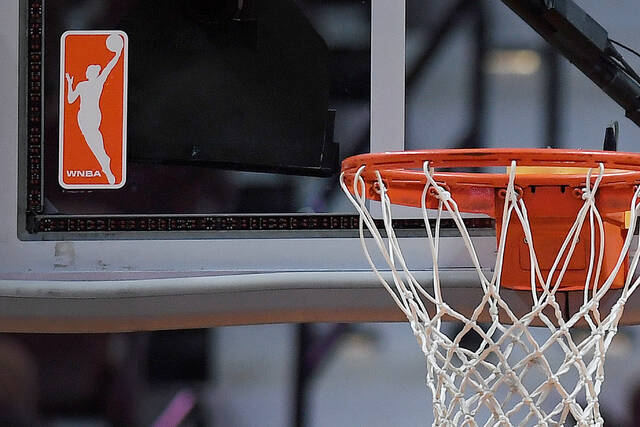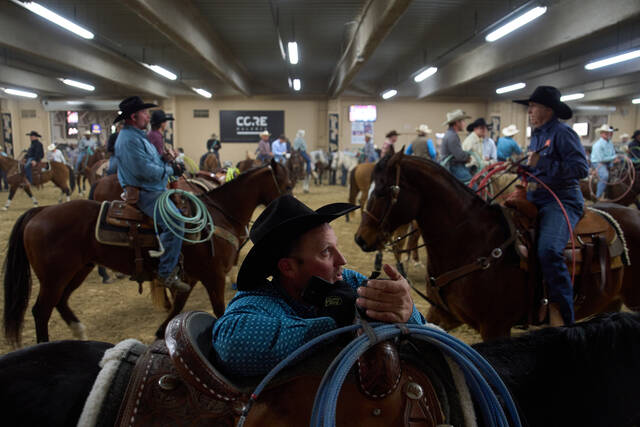The Tribune-Review is following its Best to Ever Wear It series, a daily countdown of the greatest college and pro athletes to wear every jersey number from 99 to 0/00, by honoring the Best to Never Wear It. These six athletes didn’t wear a numbered uniform but brought pride to Pittsburgh through their sporting achievements.
Olympics (women): Lauryn Williams
Lauryn Williams had earned a reputation as the fastest female in state history when she was handed the baton at the PIAA track and field championships at least 15 meters behind the 400-meter relay race leader.
The 5-foot-3 Williams also was known for her incredible kick, and the crowd at Shippensburg University roared and rose to its feet as she raced down the stretch and leaned at the line for a first-place finish in 2001.
That moment set the stage for the diminutive but dynamic sprinter from Rochester, who would go on to Olympic fame — and infamy — but is best remembered for her comebacks.
Williams was both dominant and disappointing but her story includes a gold medal and a silver lining that is a testament to her triumphant spirit: She is one of only five athletes — and the first American woman — to medal in both the Summer and Winter Olympic Games.
After setting PIAA records in the 100- and 200-meter dashes and anchoring Rochester’s winning 400-meter relay, Williams became an NCAA champion at Miami, where she ran the 100 in 10.97 seconds to earn a berth at the 2004 Olympic Trials.
Not only did she qualify for the Summer Games in Athens, but Williams was in the lead when Yulia Nesterenko of Belarus — who had previously tested positive for performance-enhancing drugs and had never won the 100 at an international event — stunned the world by passing Williams to win gold by three-hundredths of a second over Williams (10.96), who had to settle for a silver medal.
Gold was almost guaranteed in the 400-meter relay, as the U.S. women had won the event in every Olympics since 1984. Williams was running the third leg when she got off to a fast start and outran Marion Jones, fatigued by competing in the long jump just an hour earlier, and missed the baton exchange in the 20-meter passing zone. The U.S. women’s team was disqualified.
“I turned, I took off, and thought, ‘Hey where is this stick?’ And the next thing I knew, the opportunity had come and gone,” Williams said. “I just embarrassed our whole country; this is all my fault.”
At the Beijing Games in 2008, Williams was looking for redemption when she ran the anchor leg for the 400 relay. Once again, however, the handoff went wrong. A mix-up between Williams and Torri Edwards caused Edwards to drop the baton. Williams picked it up and finished last, but the U.S. women were disqualified once again.
Publicly, Williams joked that someone must have a voodoo doll of her. Privately, she was devastated by the DQs.
“It’s a pretty big deal when you’re the person that was accountable for the demise of an opportunity not only for us to win a gold medal, but to possibly break a world record because we had two really fast teams both of those years,” Williams said. “I felt very alone in that moment.”
Williams finally got her gold at the London Games in 2012, when she ran the anchor leg in a qualifying semifinal heat. What Williams didn’t get was the redemption of running for a world record, as the U.S. women set it in 40.82 seconds in the final without her.
Soon after, Williams retired from the sport. A conversation with Olympic hurdler Lolo Jones convinced Williams to try the bobsled. After six months of practicing she became the brakewoman for the USA-1 sled at the 2014 Winter Games in Sochi.
With Elana Meyers piloting and Williams pushing the back of the bobsleigh, they set a track record of 57.26 seconds in their first run and finished the second and third runs in 57.63 and 57.69, respectively, for a lead over the reigning champion Canadians. But their final run was in 58.13, and Canada beat the Americans for gold by one-tenth of a second.
By then, Williams had a newfound perspective about chasing her Olympic dreams and realizing her goals and how she was able to captivate her country — and the world — with her incredible comebacks.
“It’s never about the medal for me,” Williams said. “I don’t need medals to validate me. To me, it’s about the experience. … It’s about the journey.”
And hers has been nothing short of amazing, start to finish.
Check out the entire ’Burgh’s Best to Wear It series here.








